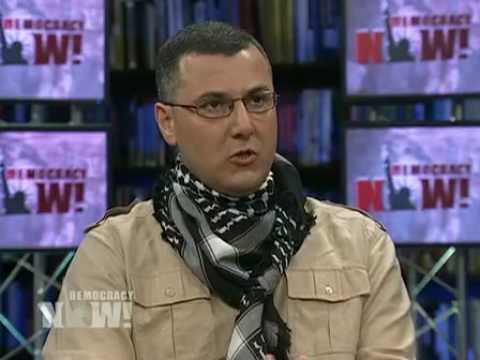
Omar Barghouti did not speak at Stanford University earlier this quarter.
Neither did he deliver his talk in real time over Skype. Instead, the sponsors of the event — Stanford Students for Justice in Palestine and Jewish Voices for Peace — streamed a pre-recorded, and presumably, pre-vetted, video of Barghouti speaking to an audience of about 25.
Prior to streaming Barghouti’s video message, Stanford Professor David Palumbo-Liu, who has previously promoted anti-Semitic material, explained that though “we [the organizers of the event] did…invite people with opposing views to debate Omar Barghouti and they declined.” Barghouti repeated this sentiment over the course of the night, saying that no one (with opposing views) would debate him.
Sitting in the small audience, composed nearly entirely of event organizers and members of the the sponsoring organizations, I stifled my laughter. I knew Barghouti had been invited to debate Professor Alan Dershowitz, one of the leading academics opposing the Boycott, Divestment, and Sanctions (BDS) movement, at Oxford University in November. Barghouti, the founder of BDS, declined. (Professor Dershowitz continues to suspect that he was actively boycotted as part of a “common sense” BDS initiative against individuals perceived to be too vocal in their support for Israel). Instead, Professor Dershowitz debated Peter Tatchell on “Is the Boycott, Divestment, and Sanctions Movement Against Israel Wrong?” and won 136 votes to 101.

In other words, from the start of the talk, I was wary of the accuracy of the statements presented by Barghouti and the event organizers. Over the course of the night, my suspicions were vindicated as Barghouti’s video message bombarded the room with outright lies, half-truths, and flawed logic.
Barghouti’s argument rested on three central claims:
- That Palestinians support the BDS movement
- That BDS is the best path towards ending the Israeli occupation of the West Bank
- That “there are no anti-Semites in the BDS movement”
Let’s unpack these ideas one by one.
- Palestinians support the BDS movement
Barghouti claimed that the BDS movement has widespread Palestinian support. But in 2013, Palestinian leader Mahmoud Abbas spoke out against the boycotts of Israel that BDS called for, saying “No, we do not support the boycott of Israel.”
Bassem Eid, hailed by the Washington Post as “an internationally recognized rights campaigner,” and the founder of the Palestinian Human Rights Monitoring Group (PHRMG), is also an outspoken critic of BDS, writing that “BDS tactics are a prelude to the destruction of the Palestinians”. In referencing the BDS pressure that led SodaStream to move its factory from the West Bank to the south of Israel, Eid wrote, “the result [of the factory move] was that 2500 Palestinians lost their jobs. When I ask those of them whom I meet what they would say if they met a BDS member, they point out that before, they were earning 6000 Israeli shekels a month… now they were receiving less than a quarter of that.”
- The BDS movement is the best path towards ending the Israeli occupation of the West Bank
This claim, a central point in Barghouti’s argument, hinges upon the false assumption that Israel is unwilling to negotiate for peace and a withdrawal from the West Bank.
In agreement with the 2008 Olmert Plan, 2004 Bush-Sharon Letter, 2000 Clinton Parameters, and 1947 Partition Agreement in UN Resolution 181, Israel has, in fact, repeatedly offered major territorial concessions in exchange for peace – including up to 97% of the West Bank. On each occasion, after already demanding numerous pre-conditions, the Palestinian leadership has walked away and denied its people the opportunity for statehood that BDS claims to promote.
BDS targets Israel as though the Jewish State requires coercion to negotiate, when in truth, Israel is the only partner at the table.
- “There are no anti-Semites in the BDS movement.”
Apart from the blatant falseness of this claim (one needs look no further than a college campus, or the British Labour Party), the claim hinges, ideologically, on the false notion that anti-Zionism is something other than anti-Semitism.
Judea Pearl, in a recent LA Times op-ed, put it best:
“Anti-Semitism targets Jews as individuals; anti-Zionism targets Jews as a people. Anti-Semitism would deny Jews equal standing as human beings; anti-Zionism would ban Israel from equal membership in the family of nations.
If we examine anti-Zionist ideology closely, we see that its aims are: to uproot one people, the Jewish people, from its homeland, to take away its ability to defend itself in sovereignty, and to delegitimize its historical identity. It is racist and fundamentally eliminationist.”
Yet Barghouti went even further in his speech that night, pandering to his audience with words like diversity and justice, while denying the facts framing the conflict, demonizing Israel, and denying the Jewish people their right to define for themselves, what anti-Semitism is.
Boycott, Divestment, and Sanctions against the world’s only Jewish state are unjust, intolerant, racist, and unproductive. One is forced to ask – is peace really what Mr. Barghouti wants?
Contributed by CAMERA Fellow at Stanford University Michal Leibowitz.
